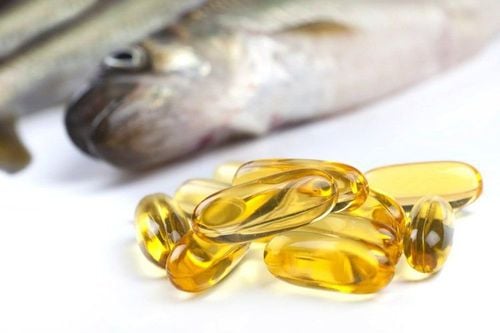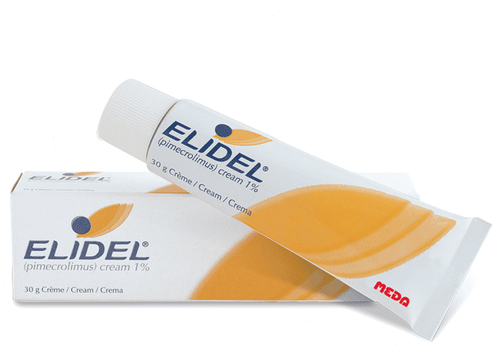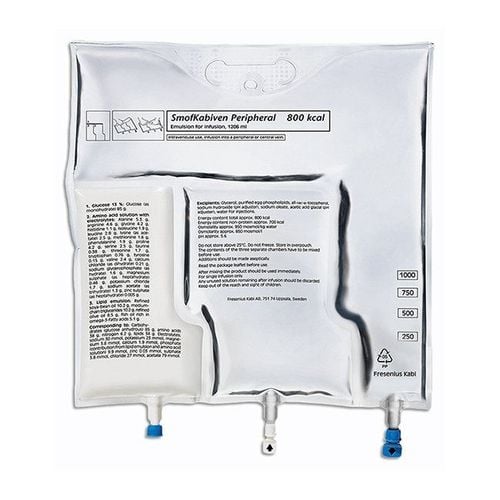This is an automatically translated article.
Eczema is a fairly common skin condition. Although it is often treated with creams, oral medications, or even injections, many studies have shown that changes in diet and lifestyle can be beneficial for eczema. Fish oil is an exceptional supplement for eczema due to its powerful anti-inflammatory properties.
1. What is Eczema? Eczema is an allergic inflammatory skin condition that is usually chronic and relatively common. The disease causes adverse symptoms that can negatively affect quality of life including: Severe itching, dry and red skin. It often leads to skin cracking and skin damage (forming fluid).
Eczema symptoms are often presented by erythema and then improve over time. However, they can lead to sleep, mood and other psychological problems.
Research in the United States shows that when people are diagnosed with eczema, there is a significant increase in the likelihood of additional symptoms of depression or serious psychological problems. Current research has shown that the cause of eczema is multifactorial. Among them are abnormalities in the skin barrier, immune system disorders or possibly genetics, exposure to polluted environments.
Eczema is usually treated with topical creams, moisturizers, phototherapy with exposure to ultraviolet light - UV rays and taking certain medications such as steroids and immunosuppressants.
2. The Role of Fish Oil in Eczema The goal in eczema treatment is to control and soothe symptoms as well as prevent flare-ups. In particular, preventing inflammation is the main key in treating eczema. As this condition is considered an inflammatory skin disorder. Inflammation is a normal immune response that can protect against disease and infection. However, chronic inflammation can lead to adverse health effects, including an increased risk of disease.

Hình ảnh người bệnh mắc bệnh chàm khô
Both inflammation of the nervous system and the skin contribute to the development of eczema. Fish oil is rich in omega-3 fatty acids, known for their powerful anti-inflammatory properties. The omega-3 fats eicosapentaenoic acid (EPA) and docosahexaenoic acid (DHA) have been shown to fight inflammation in several ways, including by inhibiting the production of inflammatory proteins.
Although, there is still a lot of research underway, some studies have also shown that fish oil supplements are beneficial for people with inflammatory conditions, such as rheumatoid arthritis and inflammatory bowel disease. (IBD).
This can be explained by the benefit of fish oil that has strong anti-inflammatory properties. In some studies, it has been shown that this supplement can also treat eczema. However, more in-depth studies are still needed to prove this association.
3. Fish Oil's Eczema Symptom Relief Effects Fish oil is one of the most popular anti-inflammatory supplements on the market. Recent research shows it can help treat many inflammatory conditions including eczema.
3.1. Using Fish Oil Beneficial for Eczema
Several studies investigating the effects of fish oil supplements on eczema have shown promising findings. However, it is important to note that there is still a lack of evidence to support this association.
A 2012 review of three studies of fish oil supplements and eczema found that fish oil treatment significantly improved quality of life and improved itching in people with eczema. . However, the researchers still acknowledge that a larger, better-designed study is needed to verify whether fish oil should be recommended as an alternative treatment for eczema.
Or another study conducted over a 16-week period in people with moderate to severe eczema demonstrated that supplementing with this omega-3 fatty acid along with vitamin E and a multivitamin has was able to reduce the severity of eczema by 50% in 80% of study participants.

Sử dụng dầu cá có thể giảm mức độ nghiêm trọng của bệnh chàm
3.2. Fish oil can prevent eczema flare-ups in babies and children
Studies have shown that taking fish oil supplements during pregnancy can help prevent the development of eczema in babies and children. children. In a study conducted in pregnant women supplemented daily with 1.6 grams and 1.1 grams of DHA from the 25th week of pregnancy and for up to 3-4 months of breastfeeding. The results of the study showed that the babies of mothers who were supplemented had a 16% lower risk of developing eczema in the first years of life compared with the group of mothers who did not supplement.
In another study, infants of mothers were supplemented with 900 mg of a combination of EPA and DHA from fish oil starting from the 21st week of pregnancy until delivery. The results showed that the risk of infant eczema was 5% lower than that of mothers who used a placebo. Another study, a meta-review of 8 studies with 3,175 children, found that mothers who were given fish oil supplements during pregnancy had a marked reduction in eczema in infants and children up to 36 months. year old.
However, not all studies have observed the full effects of fish oil. Besides, there is still research showing that, taking fish oil supplements during pregnancy can increase the risk of eczema in children. This clearly shows the need to conduct more in-depth studies on this association to have a concrete scientific basis.
4. Using Fish Oil for Eczema Aside from the potential benefits associated with eczema treatment, fish oil supplements can also benefit health in various ways such as improving health. of the heart and reduce inflammation.

Sử dụng dầu cá có thể đem lại nhiều lợi ích cho sức khỏe người dùng
Previous research showed that supplementing with 5,500 mg of DHA per day for 8 weeks improved eczema symptoms, improved blood levels of omega-3 fats, and inhibited antibody production. IgE body. Another study found that a 4,500 mg fish oil supplement containing about 2,070 mg DHA and 1,600 mg EPA was safe during pregnancy and may help reduce eczema in children. However, the dosage information for this supplement is still unknown and needs to be studied further to elucidate.
According to the Food and Drug Administration (FDA) recommended intake of combined DHA and EPA supplements should be less than 3,000mg per day. However, many studies use more doses without side effects.
Fish oil supplements Fish oil is a popular supplement and is considered safe for most people. Research shows that when taking a maximum dose of 4-5 grams per day, there is no association with any adverse side effects. However, some people may experience minor gastrointestinal symptoms such as indigestion, diarrhea... although most people tolerate it well with no side effects after using fish oil.
Long-term use of fish oil can cause interactions with blood thinners such as warfarin when taken in high doses. Therefore, before using fish oil supplements should consult a specialist or doctor to avoid adverse health effects.
Eczema can negatively affect your quality of life which is why it is important to properly treat and manage this chronic inflammatory skin condition. While conventional medications are the mainstay of treatment for eczema, natural remedies like fish oil supplements can offer some benefits. Even so, more future studies are needed to fully understand how fish oil can help treat eczema in people.

Người mắc bệnh chàm cần sử dụng dầu cá theo chỉ định của bác sĩ chuyên khoa
Vinmec International General Hospital with a system of modern facilities, medical equipment and a team of experts and doctors with many years of experience in medical examination and treatment, patients can rest assured to visit. examination and treatment at the Hospital.
To register for examination and treatment at Vinmec International General Hospital, you can contact Vinmec Health System nationwide, or register online HERE.
Reference: Healthline.com
MORE
7 Types of Eczema: Symptoms, Causes and Pictures Eczema: Care for Your Hands and Feet Eczema Treatment and Prevention













